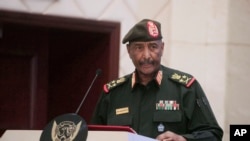"Nobody will negotiate in earnest until they feel that the military balance is not moveable any more," said Rift Valley Institute analyst Magdi El Gizouli. "The internal dynamic of this war is a bit beyond what an external actor can really influence".
Neither the army nor the paramilitary Rapid Response Forces (RSF) seem far enough backed into a corner to take cease-fire talks in Jeddah seriously, which diplomats partly blame on rival regional powers aligning with different sides.
Fighting rocked several vulnerable cities in western Sudan on Wednesday in an expansion of the country's almost two-month-old war as the number of people who have fled their homes rose above two million.
The war between the army and the paramilitary Rapid Support Forces has caused a humanitarian crisis in Khartoum, as well as cities including El Obeid, Nyala, El Fashir, and El Geneina, where more than 1,100 people have been killed.
Speaking to Al-Hadath TV from El Geneina as gun and artillery fire could be heard, Khamis Abbakar, the governor of West Darfur state, called for international intervention in what he described as a "genocide."
"Civilians are being killed randomly and in large numbers," he said. While the RSF and allied militias had originally targeted areas of El Geneina where members of the Masalit tribe lived, these attacks had now spread to the entire city, he said.
In an effort to stop the conflict, bringing more regional players to support talks, such as Egypt, which sees the army as the best bet for a stable neighbor, and the United Arab Emirates, which has backed the RSF leader in the past, may be key to progress, one U.S. official said.
A senior U.S. State Department official told reporters existing parties to the talks had considered broader participation, adding that Cairo and Abu Dhabi "do have specific leverage that could be helpful."
The United States and Saudi Arabia, which lies across the Red Sea from Sudan, have sponsored talks in the Saudi port city of Jeddah. But every temporary truce has been violated so far, even though both sides say they are committed to negotiations and despite U.S. sanctions.
Diplomats with knowledge of the talks say the Jeddah process was faltering partly because key players were absent, including Egypt, which also has a general-turned-politician at its helm, and the UAE, which has ties to RSF commander Mohamed Hamdan Dagalo, known as "Hemedti."
A Cairo-based diplomat said a new African Union-led forum aimed to bind Arab and African states into the process, including Egypt and the UAE, though it was unclear that either country was ready to exert real pressure.
Mohamed Mokhtar, a senior advisor to Hemedti, said the RSF supported the Jeddah and A.U. processes, and that these should be expanded to civilian parties in order to reach a "comprehensive solution".
Speaking to Al-Hadath TV from El Geneina as gun and artillery fire could be heard, Khamis Abbakar, the governor of West Darfur state, called for international intervention in what he described as a "genocide."
"Civilians are being killed randomly and in large numbers," he said. While the RSF and allied militias had originally targeted areas of El Geneina where members of the Masalit tribe lived, these attacks had now spread to the entire city, he said.
Speaking to Al-Hadath TV from El Geneina as gun and artillery fire could be heard, Khamis Abbakar, the governor of West Darfur state, called for international intervention in what he described as a "genocide."
"Civilians are being killed randomly and in large numbers," he said. While the RSF and allied militias had originally targeted areas of El Geneina where members of the Masalit tribe lived, these attacks had now spread to the entire city, he said.
Army chief Gen. Abdel Fattah al-Burhan could not be part of any future authority in Sudan, Mokhtar told Reuters, and Hemedti, who he said was with his forces on the battlefield, would not have a political role but would continue to lead the RSF.
The army did not immediately respond to questions.
Adding to the overlapping peace initiatives, Kenya's president said on Tuesday that another African grouping within the forum, IGAD, intended to meet Hemedti and army chief al-Burhan in the next 10 days in a bid to stop the war.
The failure of talks has put the nation, which was already reliant on aid, in a perilous humanitarian state. Of the nearly 2 million who have fled, almost 500,000 have crossed to neighboring states.
The death toll probably runs into thousands, although with authorities dispersed around the country and many hospitals closed, precise numbers are difficult to ascertain.
The U.S. State Department said on Tuesday that 2.5 million people were reached with assistance because of some compliance to cease-fires, although aid organizations have been struggling to deploy, partly because of tight controls imposed by the army in Port Sudan.
"If they keep fighting it out, the Sudanese state is collapsing. It could take generations to try to put back together," said Alan Boswell, Horn of Africa Director for Crisis Group.
"It will be a massive migraine for Africa, the Middle East and Europe for a long time to come unless people get more serious about stopping this."






![IGAD to Send Delegation to Meet With Sudan's Warring Generals [3:04]](https://gdb.voanews.com/01000000-c0a8-0242-541c-08db6c1cd5f6_w33_r1.png)




Forum